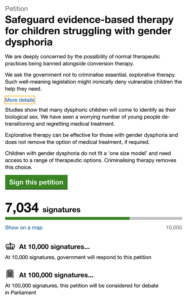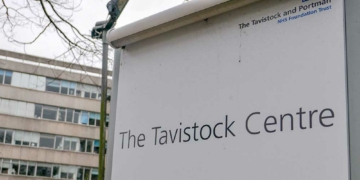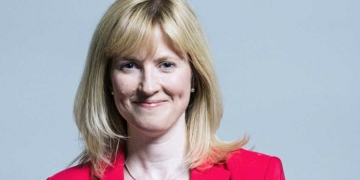James Esses takes his oath ‘to first do no harm’ seriously; he is committed to protecting vulnerable children from unnecessary medical intervention. A post-graduate trainee therapist, Esses has volunteered as counsellor for a children’s service for the past five years. He began to notice a ‘stark increase’ in the number of clients presenting with gender dysphoria. Curious about this new trend Esses began “researching and reading peer reviewed studies” – what he saw shook his confidence in the professional bodies that oversee therapeutic practice.
Of children Esses helps with gender dysphoria, “most if not all presented with a mental health condition or something else that they’re particularly struggling with.”
He adds “I’ve had some young people start the conversation by saying that they don’t see any option apart from medication and surgery, by the end of the conversation they’re actually willing to think, is it possible that I can try to accept myself as I am? Is it possible that I might feel differently in a few years’ time?”
“…by the end of the conversation they’re actually willing to think, is it possible that I can try to accept myself as I am? Is it possible that I might feel differently in a few years’ time?”
He believes the prevailing approach, whereby people are affirmed in their cross-sex identities, is leading to children being put on a medical pathway for what is a mental health issue. Treatments with puberty blockers are now acknowledged by the NHS to have unknown long-term side-effects, and cross-sex hormones can lead to infertility and potential damage to internal organs. Gender dysphoria is often a symptom of an underlying issue.
“I’ve read numerous studies which identify a number of comorbidities which make it more likely that somebody is going to suffer from gender dysphoria, ranging from previous traumatic experiences serious bullying in school and autism.”
“The statistics on internalised homophobia are stark; I read a paper recently which said that upwards of 70% of people who come out as transgender also identify as gay. I’ve read statements and interviews from some people who’ve said that as far as their family or the culture were concerned it was far preferable that they were ‘trapped in the wrong body’ than gay.”

James Esses
Esses felt a sense of relief and vindication when he came across professionals with similar reservations. Until recently, many therapists have been too scared to ‘come out’ and voice their opinions publicly due to fears of accusations of ‘transphobia’. After liaising through a social media network, last month Esses became one of the founding members of a new group called Thoughtful Therapists.
Thoughtful Therapists is a collective of clinicians ranging from experienced, senior practitioners to those new to the profession. They are “steadfastly against conversion therapy” yet concerned about legislation and guidelines which will prevent therapeutic options for those with gender dysphoria.
Thoughtful Therapists are already beginning to make waves. The group recently announced the launch of a campaign challenging a Memorandum of Understanding on Conversion Therapy, a joint document signed by 20 health, counselling and psychotherapy organisations.
Despite being newly formed, Thoughtful Therapists are already beginning to make waves. The group recently announced the launch of a campaign challenging a Memorandum of Understanding on Conversion Therapy, a joint document signed by 20 health, counselling and psychotherapy organisations. This is because they believe: “it leaves therapists no choice but to affirm clients with gender dysphoria and prohibits them from exploring underlying causes.” Thoughtful Therapists have also launched a petition calling for protection of therapists seeking to help youth with gender dysphoria.
Esses is enthusiastic about the new group: “we’re moving quite quickly and are growing in numbers as well. We’ve already got a good mix of therapists from a range of backgrounds, modalities and with years of experience.”
Esses believes that lobby groups which purport to advocate for transgender people, like Mermaids and Stonewall, have influenced mainstream clinical practice. He tells me: “they’ve got a lot of clout and they’ve managed to infiltrate organisations, charities and even the government. Their message has been pushed strongly to the point that we’re now in a position where anything other than quasi-encouragement and/or affirmation towards transitioning is seen as potentially transphobic.”
He believes this is harmful for young people: “Young people are probably feeling a lot more confused about who they are than previously, because now we’ve all been told we were assigned a gender at birth. That immediately raises question marks in your head ‘what am I?’ ‘what could I be?’”
“Stonewall and others are calling for a system in which it would appear that anything other than affirming transition could be classed as conversion therapy. Legislation has already been passed in Australia to ban conversion therapy and the wording is so vague and so broad that arguably it could capture almost anything that doesn’t affirm…”
“Stonewall and others are calling for a system in which it would appear that anything other than affirming transition could be classed as conversion therapy. Legislation has already been passed in Australia to ban conversion therapy and the wording is so vague and so broad that arguably it could capture almost anything that doesn’t affirm… you’re going to have allegations flying about left right and centre; crucially you’re going to have therapists who just do not want to even engage in this work. I’ve already spoken to so many therapists say that if the ban comes to pass they just won’t see clients.”
Their reticence is understandable, not only would they risk being struck off as an accredited therapist there is also the risk of criminal charges. In Canada professionals can face a five-year custodial sentence if convicted of gender identity conversion therapy. In essence, vulnerable children could be prevented from getting the help they need, and conscientious therapists will face an impossible task.
Thoughtful Therapists are part of a wider resistance from those working in the therapeutic professions. The push to affirm young people’s identities has led to a raft of resignations at gender-identity clinics. Between 2016 and 2019, 35 staff members left the Gender Identity Services (GIDS) at the NHS Tavistock. Numerous senior clinicians have spoken-out and blown the whistle about the influence of transgender lobby groups on clinical practice. The latest to be hit by scandal is the British Psychological Society which is being investigated by the Charity Commission over allegations that it is potentially putting patients at risk by arguing for the right for psychologists to prescribe drugs including hormone blockers.
Thoughtful Therapists’ petition to “Safeguard evidence-based therapy for children struggling with gender dysphoria” has already attracted over 7,000 signatures, when it reaches 10,000 the government will be forced to issue a formal response.
Thoughtful Therapists’ petition to “Safeguard evidence-based therapy for children struggling with gender dysphoria” has already attracted over 7,000 signatures, when it reaches 10,000 the government will be forced to issue a formal response. Esses is keen for this to be achieved soon; it has been suggested that a ban on conversion therapy is due to be announced in the Queen’s Speech on 11th May. He explained: “We want politicians to listen to us, if they are presented with a balanced argument they will understand.”

James Esses’ petition to the government
Explaining the position of Thoughtful Therapists can be a struggle: “once people hear what the issue is then most people are likely to be supportive… but it’s difficult, because everyone wants to be seen as an ally, they don’t want to be seen as transphobic.”
The petition calling for a ban on conversion therapy, including on the basis of gender identity, gained huge public support and over 250,000 signatures thanks in part to its promotion by Stonewall.
“That’s the irony of all this – the risk of potential legislation is that it could end up actually in and of itself being a form of conversion therapy. One of the core tenets of being a therapist is that you should never go into any dialogue with a client with any kind of preconceived idea of where you feel it should end up. If this legislation goes through and you’re only really allowed to affirm someone, well that’s exactly what you’re doing. Therapists have an ethical duty to explore all options by offering that gentle challenge by being curious about causation… Anyone who tries to say that this legislation would not cause these issues I think is frankly misguided or wilfully misleading.”
Esses is hopeful that public and political opinion is beginning to shift. His plea to those wishing to support Thoughtful Therapists is that firstly they sign and share the petition, and secondly that they speak out.
“I know it’s particularly difficult given the kind of vitriol on social media, but if people could just speak out and stand up for what they believe in, whether it’s with friends, colleagues or family it could make a big difference. The organisations we’re up against have loud voices, we need to make sure we’re heard too.”
You can sign the Thoughtful Therapists’ petition to Parliament and the government here
























Comments
No comments yet, be the first to leave a comment.